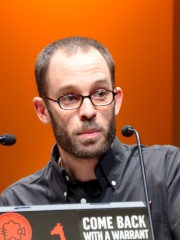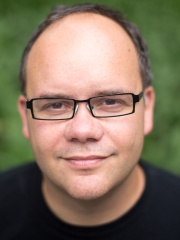






The Most Famous
COMPUTER SCIENTISTS from Germany
This page contains a list of the greatest German Computer Scientists. The pantheon dataset contains 245 Computer Scientists, 8 of which were born in Germany. This makes Germany the birth place of the 4th most number of Computer Scientists behind United Kingdom, and Canada.
Top 8
The following people are considered by Pantheon to be the most legendary German Computer Scientists of all time. This list of famous German Computer Scientists is sorted by HPI (Historical Popularity Index), a metric that aggregates information on a biography's online popularity.

1. Joseph Weizenbaum (1923 - 2008)
With an HPI of 62.52, Joseph Weizenbaum is the most famous German Computer Scientist. His biography has been translated into 28 different languages on wikipedia.
Joseph Weizenbaum (8 January 1923 – 5 March 2008) was a German-American computer scientist and a professor at the Massachusetts Institute of Technology. He is the namesake of the Weizenbaum Award and the Weizenbaum Institute.

2. Ian Murdock (1973 - 2015)
With an HPI of 60.33, Ian Murdock is the 2nd most famous German Computer Scientist. His biography has been translated into 40 different languages.
Ian Ashley Murdock (April 28, 1973 – December 28, 2015) was an American software engineer, known for being the founder of the Debian project and Progeny Linux Systems, a commercial Linux company.

3. Rudolf Bayer (b. 1939)
With an HPI of 55.00, Rudolf Bayer is the 3rd most famous German Computer Scientist. His biography has been translated into 15 different languages.
Rudolf Bayer (born 3 March 1939) is a German computer scientist. He is a professor emeritus of Informatics at the Technical University of Munich where he has been employed since 1972. He is noted for inventing three data sorting structures: the B-tree (with Edward M. McCreight), the UB-tree (with Volker Markl) and the Red–black tree. Bayer is a recipient of 2001 ACM SIGMOD Edgar F. Codd Innovations Award. In 2005 he was elected as a fellow of the Gesellschaft für Informatik.

4. Werner Koch (b. 1961)
With an HPI of 46.20, Werner Koch is the 4th most famous German Computer Scientist. His biography has been translated into 15 different languages.
Werner Koch (born July 11, 1961) is a German free software developer. He is best known as the principal author of the GNU Privacy Guard (GnuPG or GPG). He was also Head of Office and German Vice-Chancellor of the Free Software Foundation Europe. He is the winner of Award for the Advancement of Free Software in 2015 for founding GnuPG. Journalists and security professionals rely on GnuPG, and Edward Snowden used it to evade monitoring whilst he leaked classified information from the United States National Security Agency.

5. Tron (1972 - 1998)
With an HPI of 45.01, Tron is the 5th most famous German Computer Scientist. His biography has been translated into 17 different languages.
Boris Floricic (8 June 1972 – 17 October 1998), better known by his pseudonym Tron, was a German hacker and phreaker whose death in unclear circumstances has led to various conspiracy theories. He is also known for his Diplom thesis presenting one of the first public implementations of a telephone with built-in voice encryption, the "Cryptophon". Floricic's pseudonym was a reference to the eponymous character in the 1982 Disney film Tron. Floricic was interested in defeating computer security mechanisms; amongst other hacks, he broke the security of the German phonecard and produced working clones. He was subsequently sentenced to 15 months in jail for the physical theft of a public phone (for reverse engineering purposes) but the sentence was suspended to probation. From December 2005 to January 2006, media attention was drawn to Floricic when his parents and Andy Müller-Maguhn brought legal action in Germany against the Wikimedia Foundation and its German chapter Wikimedia Deutschland e.V. The first preliminary injunction tried to stop Wikipedia from publishing Floricic's full name, and a second one followed, temporarily preventing the use of the German Internet domain wikipedia.de as a redirect address to the German Wikipedia.

6. Daniel Domscheit-Berg (b. 1978)
With an HPI of 44.84, Daniel Domscheit-Berg is the 6th most famous German Computer Scientist. His biography has been translated into 18 different languages.
Daniel Domscheit-Berg (German: [ˈdaːni̯eːl ˌdɔmʃaɪtˈbɛʁk, -ni̯ɛl -]; né Berg; born 1978), previously known under the pseudonym Daniel Schmitt, is a German technology activist. He is best known as the former spokesperson for WikiLeaks and the author of Inside WikiLeaks: My Time with Julian Assange at the World's Most Dangerous Website (2011). Domscheit-Berg began working with WikiLeaks after meeting Assange at the Chaos Computer Club's annual conference in 2007. In August 2010, Domscheit-Berg was suspended from WikiLeaks by Assange after Domscheit-Berg challenged Assange's effectiveness as a leader. In September 2010, Domscheit-Berg resigned from WikiLeaks, saying "WikiLeaks has a structural problem. I no longer want to take responsibility for it, and that's why I am leaving the project." Upon leaving WikiLeaks, Domscheit-Berg allegedly destroyed thousands of unpublished documents. On 17 December 2010, he announced plans to open a new website for anonymous online leaks called OpenLeaks. At a Chaos Computer Club (CCC) event in August 2011, he announced its preliminary launch and invited hackers to test the security of the OpenLeaks system. The launch was a failure as it was unable to get online. The CCC criticized Domscheit-Berg for exploiting the good name of the club to promote his OpenLeaks project and expelled him from the club. This decision was revoked in February 2012. In September 2011, several news organizations cited Domscheit-Berg's split from Julian Assange and WikiLeaks as one of a series of events that led to the release that month of all 251,287 United States diplomatic cables in the Cablegate affair. In 2011, he was named by Foreign Policy magazine in its FP Top 100 Global Thinkers.

7. Denny Vrandečić (b. 1978)
With an HPI of 41.17, Denny Vrandečić is the 7th most famous German Computer Scientist. His biography has been translated into 16 different languages.
Zdenko "Denny" Vrandečić (born 27 February 1978) is a Croatian computer scientist. He was a co-developer of Semantic MediaWiki and Wikidata, the lead developer of the Wikifunctions project, and an employee of the Wikimedia Foundation as a Head of Special Projects, Structured Content. He published modules for the German role-playing game The Dark Eye. He lived in the San Francisco Bay Area in California, United States, until mid 2024, after which he returned to Stuttgart.

8. Coraline Ada Ehmke (b. 2000)
With an HPI of 26.82, Coraline Ada Ehmke is the 8th most famous German Computer Scientist. Their biography has been translated into 16 different languages.
Coraline Ada Ehmke is an American software developer, open source advocate, Founder and Executive Director of the Organization for Ethical Source. She is the author of We Just Build Hammers: Stories from the Past, Present, and Future of Responsible Tech, published by Apress in 2025. Currently based in Chicago, Illinois, Ehmke began her career as a web developer in 1994 and has worked in a variety of industries, including engineering, consulting, education, advertising, healthcare, and software development infrastructure. She is known for her work in Ruby, and in 2016 earned the Ruby Hero award at RailsConf, a conference for Ruby on Rails developers. She is also known for her social justice work and activism, writing the Contributor Covenant and Post-Meritocracy Manifesto, and promoting the widespread adoption of codes of conduct for open source projects and communities.
People
Pantheon has 8 people classified as German computer scientists born between 1923 and 2000. Of these 8, 5 (62.50%) of them are still alive today. The most famous living German computer scientists include Rudolf Bayer, Werner Koch, and Daniel Domscheit-Berg. The most famous deceased German computer scientists include Joseph Weizenbaum, Ian Murdock, and Tron.
Living German Computer Scientists
Go to all RankingsRudolf Bayer
1939 - Present
HPI: 55.00
Werner Koch
1961 - Present
HPI: 46.20
Daniel Domscheit-Berg
1978 - Present
HPI: 44.84
Denny Vrandečić
1978 - Present
HPI: 41.17
Coraline Ada Ehmke
2000 - Present
HPI: 26.82
Deceased German Computer Scientists
Go to all RankingsOverlapping Lives
Which Computer Scientists were alive at the same time? This visualization shows the lifespans of the 3 most globally memorable Computer Scientists since 1700.

